[vc_row][vc_column][vc_single_image image=”949″ img_size=”full” alignment=”center”][vc_custom_heading text=”“A Piece of My Mind”” font_container=”tag:h1|font_size:50px|text_align:center|color:%232633ef” google_fonts=”font_family:Bitter%3Aregular%2Citalic%2C700|font_style:700%20bold%20regular%3A700%3Anormal”][vc_custom_heading text=”April 2019 Newsletter” font_container=”tag:h1|font_size:30px|text_align:center|color:%232633ef” google_fonts=”font_family:Bitter%3Aregular%2Citalic%2C700|font_style:400%20regular%3A400%3Anormal”][/vc_column][/vc_row][vc_row][vc_column width=”2/3″][vc_column_text]
Advancing Christian Faith and Values,
Defending Religious Liberty for All,
Supporting Civility and the Common Good
through Preaching, Teaching, Writing, Activism and Reasoned Conversations
www.donaldshoemakerministries.com[/vc_column_text][/vc_column][vc_column width=”1/3″][vc_single_image image=”687″ img_size=”full” alignment=”center”][/vc_column][/vc_row][vc_row][vc_column][vc_column_text]
 A Voice of Reason and Wisdom –
A Voice of Reason and Wisdom –
“I believe that the pursuit of truth and right ideas through honest debate and rigorous argument is a noble undertaking.”
– From Charles Krauthammer’s final opinion column, June 8, 2018, before his death on June 21 (from The Point of It All by Charles Krauthammer)
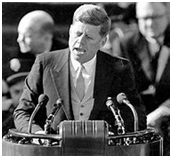 A Word Needed Now More Than Ever –
A Word Needed Now More Than Ever –
“Ask not what your country can do for you, but ask what you can do for your country.”
– Inaugural speech by President John F. Kennedy (1961)[/vc_column_text][/vc_column][/vc_row][vc_row][vc_column width=”1/3″][vc_single_image image=”1190″ img_size=”full” alignment=”center”][/vc_column][vc_column width=”1/3″][vc_single_image image=”1191″ img_size=”full” alignment=”center”][/vc_column][vc_column width=”1/3″][vc_single_image image=”1192″ img_size=”full” alignment=”center”][/vc_column][/vc_row][vc_row][vc_column][vc_column_text]
[PART 1] Evangelical Christianity: Beliefs and Practices
“Southern California Interfaith Council “Religion 101” Series
(February 28, 2019)
Presenter: Dr. Donald P. Shoemaker Pastor Emeritus, Grace Community Church of Seal Beach
Common (but WRONG!) Accusations Against Evangelicals:
• “Creating a ‘Christian America’ is the goal of Evangelicals.”
• “All Evangelicals back Donald Trump.”
• “Evangelicals want to use religion as an excuse to impose their beliefs on others.”
1 (of 10). “Evangelicalism” is all about “giving out the ‘Good Word’”.
“Evangelicalism” is a declarative, conversionist, mission-minded movement.
“euangelion” (ευαγγελιον) – “The ‘Evangel’, the ‘Good News’”
“euangelizo” (ευαγγελιζω) – “To evangelize, announce Good News”
“euangelistes” (ευαγγελιστης) – “Evangelist, preacher of Good News”
“Go and make disciples of all the nations…” (Matthew 28:19—Jesus’ command)
“I am sending you to [the Gentiles] to open their eyes and turn them from darkness to light…so that they may receive forgiveness of sins and a place among those who are sanctified by faith in me.” (Vision of Jesus by Saul of Tarsus, Acts 26:17-18)
“I am not ashamed of the gospel, because it is the power of God for the salvation of everyone who believes…” (Romans 1:16)
Many other texts could be offered. These suffice to show the conversionist impulse of Evangelicalism and that the conversion is toward God and in faith and obedience to Jesus.
The Book of Acts and the earliest history of Christianity show how evangelism by a small band of Jesus’ followers could extend a movement to where it became a significant presence in the Roman Empire in just about 35 years.
2. “Evangelicalism” is “Christ-centered” and “cross-centered”.
“If you confess with your mouth, ‘Jesus is Lord,’ and believe in your heart that God raised him from the dead, you will be saved.” (Romans 10:9)
“The message of the cross…is the power of God.” (1 Corinthians 1:18)
“I want to remind you of the gospel [euangelion] I preached to you… By this gospel you are saved… For what I received I passed on to you as of first importance: that Christ died for our sins…he was buried…he was raised on the third day…”
(1 Corinthians 15:1-4)
That Jesus is the Son of God, the Word made flesh, and that Jesus died on the cross for our sin—no Evangelical can budge on these. These are central, crucial, non-negotiable.
Genuine dialogue requires openness and honesty about areas of agreement and disagreement. So any real dialogue between Christians and Muslims has to face the questions: “Who is God? Who is Jesus? Did Jesus die for our sins?”
Contrast the recent document: “Human Fraternity for World Peace and Living Together” (February, 4, 2019), signed by Pope Francis and the Grand Imam of Al-Azhar, Ahmed el-Tayeb. The moral applications are excellent but the foundation is shaky because “God” means different things to Muslims and Christians, who teach Jesus is the Son of God. *
The first and most important aim of religions is to believe in God, to honor Him and to invite all men and women to believe that this universe depends on a God who governs it. He is the Creator who has formed us with His divine wisdom and has granted us the gift of life to protect it. It is a gift that no one has the right to take away, threaten or manipulate to suit oneself. Indeed, everyone must safeguard this gift of life from its beginning up to its natural end. We therefore condemn all those practices that are a threat to life such as genocide, acts of terrorism, forced displacement, human trafficking, abortion and euthanasia. We likewise condemn the policies that promote these practices.
Muslims do not believe Jesus died on the cross. For Evangelical Christians the cross is central, not incidental, and certainly not deniable or disposable.
This biblical confession sounds like it was written for today: “This is the one who came by water and blood—Jesus Christ. He did not come by water only, but by water and blood.” (1 John 5:6). “Water” most likely refers to the baptism of Jesus, “blood” his death on the cross.
Through the cross, Jesus, the Lamb of God, took away the sins of the world. The benefit of his death is appropriated through faith in the message.
* While orthodox Christianity and Islam understand “God” differently, some points of agreement are to be noted: both (along with Judaism) are Abrahamic in their roots and are monotheistic, which tends to create universal ethics rather than parochial ethics, and there will often be ethical alignment between the two.
3. “Evangelicalism” holds the Scriptures (66 books of the Old and New Testaments) in the highest regard as “inspired of God”, the final authority in faith and obedience.
2 Timothy 3:16 – Scripture is “God breathed” and thus “profitable” for instruction, correction, and preparing people to serve God in the world.
The exact nature of “inspiration”, how “inspiration” affects interpretation of various biblical genres (e.g., poetry, narrative, epistle, apocalyptic), how the Bible interacts with secular disciplines—these are issues to discuss on another day.
4. “Evangelicalism” is confessional
Evangelicals recognize the need to confess certain doctrinal matters, the denial of any crucial doctrine putting one outside the pale of Evangelical Christianity. (See the Nicene Creed and the Statement of Faith of the National Association of Evangelicals in an Appendix at the end of this Newsletter.)
– Points 5-10 will be in the May Newsletter –
[/vc_column_text][/vc_column][/vc_row][vc_row][vc_column][vc_column_text]
Bible Insight – What is “Holy Week”?
Most Christians observe “Holy Week” (April 14-20) if not entirely at least in part. What is “Holy Week” and what significance do its features have for us?
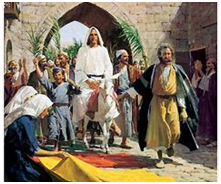 Palm Sunday –
Palm Sunday –
The grand triumphant entrance of Jesus into Jerusalem with the celebrating crowd announcing who Jesus is.
They [the disciples] brought the donkey and the colt and placed their cloaks on them for Jesus to sit on. A very large crowd spread their cloaks on the road, while others cut branches from the trees and spread them on the road. The crowds that went ahead of him and those that followed shouted,
“Hosanna to the Son of David!”
“Blessed is he who comes in the name of the Lord!”
“Hosanna in the highest heaven!”
When Jesus entered Jerusalem, the whole city was stirred and asked, “Who is this?” The crowds answered, “This is Jesus, the prophet from Nazareth in Galilee.” (Matthew 21:7-11)
Spy Wednesday –
A little-observed remembrance of the treacherous planning of Judas to betray Jesus at an opportune time.
Then one of the Twelve—the one called Judas Iscariot—went to the chief priests and asked, “What are you willing to give me if I deliver him over to you?” So they counted out for him thirty pieces of silver. From then on Judas watched for an opportunity to hand him over.
(Matthew 26:14-16)
Maundy Thursday –
Called “Maundy” after the Latin word “mandatum” (commandment).
On this day Jesus said to his disciples: “A new command I give you: Love one another. As I have loved you, so you must love one another” (John 13:34).
Also on this day Jesus celebrated the Passover (this particular meal we call “The Last Supper”). During this Supper two important observances took place: (1) Jesus rose from the meal and washed his disciples’ feet (John 13:1-17), and (2) Jesus instituted the Communion of the Bread and the Cup (the “Eucharist,” which means the “thanksgiving”). He shared bread and wine with his disciples with the words, “This is my body” and “This is my blood of the covenant, which is poured out for many” (Mark 14:22-24).
Jesus then announced, “I will not drink again of the fruit of the vine until that day when I drink it anew in the kingdom of God” (Mark 14:25). Partaking of Communion, therefore, gives Christians anticipation and hope as they await the fulfillment of these words when Jesus returns (1 Corinthians 11:26).
Many churches observe Maundy Thursday in a special way. A meal is shared. Believers wash one another’s feet. Finally, all partake of the Eucharist. Perhaps the service will end with a hymn, just as The Last Supper ended.
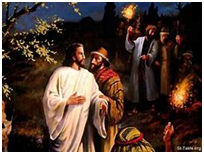 Good Friday
Good Friday
Following the Supper, Jesus went to the Mount of Olives to pray. His followers failed to pray with him and missed the strength prayer will bring.
Suddenly it was too late to pray, as Judas approached with soldiers to identify Jesus with the sign of a kiss. Jesus was arrested and taken away. All his followers fled in spite of their pledges of loyalty, except Peter who followed Jesus from a distance. But even Peter would deny his Lord as events unfolded.
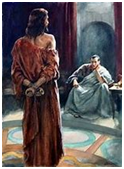 Throughout the night and into the day Jesus appeared before many religious and secular leaders to be accused, mocked and denounced. He was beaten, scourged and humiliated. Finally, the Roman Governor, Pontius Pilate, acquiesced to the crowd and delivered Jesus to be nailed to a Roman cross—one of the most shameful, hurtful, prolonged forms of capital punishment known to man. (Read Mark 14:43-15:41; John 18:1-19:16)
Throughout the night and into the day Jesus appeared before many religious and secular leaders to be accused, mocked and denounced. He was beaten, scourged and humiliated. Finally, the Roman Governor, Pontius Pilate, acquiesced to the crowd and delivered Jesus to be nailed to a Roman cross—one of the most shameful, hurtful, prolonged forms of capital punishment known to man. (Read Mark 14:43-15:41; John 18:1-19:16)
Jesus was on the cross for six hours, during which time he forgave his enemies and promised hope to a dying criminal who begged his mercy. After he died, he was buried in a rich man’s tomb (Luke 23:26-56; John 19:17-42).
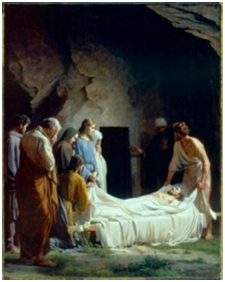 In light of this horror, why call the day “Good Friday”? Because the death of Jesus paid the penalty for the sins of every man and woman who ever lived, and opened the pathway of faith in him, for forgiveness and eternal life.
In light of this horror, why call the day “Good Friday”? Because the death of Jesus paid the penalty for the sins of every man and woman who ever lived, and opened the pathway of faith in him, for forgiveness and eternal life.
Holy Saturday
Jesus’ body lay in the tomb that was given him. Roman guards sealed and “protected” the tomb, lest (as the religious leaders claimed) his disciples might come and steal the body. The disciples, however, were secluded in fear.
Such is our quick journey through Holy Week. Nothing can replace reading the dramatic but credible accounts of Matthew, Mark, Luke and John, beginning with the Triumphal Entry on Palm Sunday and ending with Jesus’ burial (suggested reading: Luke 19:28-48 and chapters 22-23). *
Holy Week is followed by Resurrection Day! Without this, Holy Week is without significance and our salvation is impossible.
“By this gospel you are saved…Christ died for our sins according to the Scriptures, …he was buried, …he was raised on the third day according to the Scriptures, …he appeared to Cephas [Peter], and then to the Twelve. After that, he appeared to more than five hundred of the brothers and sisters at the same time, most of whom are still living, though some have fallen asleep. Then he appeared to James, then to all the apostles, and last of all he appeared to me…”
– The Apostle Paul (1 Corinthians 15:2-8)
* The movie “The Passion of the Christ” (2004) is a very intense portrayal of Passion Week. I recommend it, with the caveat that the punishments inflicted on Jesus are too extreme. And I wish the movie had included Joseph of Arimathea entombing Jesus after gaining permission from Pilate to remove Jesus’ body from the cross. Joseph wrapped the body of Jesus in linen and put it in a new tomb hewn from rock. He rolled a big stone in front of the entrance and left. (Matthew 27:57-61—all four Gospel accounts report this.)[/vc_column_text][/vc_column][/vc_row][vc_row][vc_column][vc_column_text]
First Amendment Vigilance – H. Resolution 183
 I wish to use this space to discuss House Resolution 183 of March 7, 2019, condemning anti-Semitism and “condemning anti-Muslim discrimination and bigotry against minorities…” Read this resolution at:
I wish to use this space to discuss House Resolution 183 of March 7, 2019, condemning anti-Semitism and “condemning anti-Muslim discrimination and bigotry against minorities…” Read this resolution at:
https://congress.gov/bill/116th-congress/house-resolution/183
1. Unlike some, I have no problem with a resolution that focuses on issues and leaves off names. If the House ought to call out and censure a particular member by name, it can and should do so.
2. The document is well written and its thoughts are not new. Much is from a two decades old “Working Definition of Anti-Semitism.”
3. By focusing on issues other than anti-Semitism, the rightful spotlight on anti-Semitism is diffused and the impact lessened. The 1252-word document has 430 words on anti-Semitism and 234 words on anti-Muslim discrimination. While a document on bigotry is in order, this particular document was initially compelled by concern over anti-Semitic statements by members of Congress, and its voice condemning that has therefore been diluted.
4. Only FIFTEEN words (that’s 15!) speak of anti-Christian discrimination. And they reach all the way back to 1960 and candidate John F. Kennedy’s Catholic faith and the fear he might show “dual loyalty” to the U.S. and the Vatican. Kennedy greatly disarmed this concern with his masterful speech to Baptist ministers. C’mon now! This document could easily fill a page on contemporary anti-Christian discrimination like that of Senators Feinstein, Sanders, Harris and Hirono.
5. Nothing is said of racial bigotry by clergy such as Al Sharpton, Louis Farrakhan and Jeremiah Wright.
6. In short, the document didn’t do enough because it did too much. And if its intention all along was to reach beyond anti-Semitism it fell way short in all that should be said.
7. The document properly underscores “the transcendent principles of tolerance, religious freedom, and equal protection as embodied in the Declaration of Independence and the first and 14th amendments to the Constitution.” Do these![/vc_column_text][/vc_column][/vc_row][vc_row][vc_column][vc_column_text]
Good News from Grace – 75th Anniversary!
www.gracesealbeach.org[/vc_column_text][/vc_column][/vc_row][vc_row][vc_column width=”1/3″][vc_single_image image=”1197″ img_size=”full” alignment=”center”][/vc_column][vc_column width=”1/3″][vc_column_text]
Grace Community Church of Seal Beach, where I was privileged to serve as pastor for 28 years, had a grand celebration on March 24. Our Worship Center was packed with an excited crowd to celebrate our heritage and be challenged toward Tomorrow.
[/vc_column_text][/vc_column][vc_column width=”1/3″][vc_single_image image=”1198″ img_size=”full” alignment=”center”][/vc_column][/vc_row][vc_row][vc_column][vc_column_text]
What an exciting event to participate in! All indicators point forward to a great future for a unique church in a special place—with all the joys and challenges that come from being a block from the ocean beach. Onward—to the Service and Glory of God!
[/vc_column_text][/vc_column][/vc_row][vc_row][vc_column width=”1/3″][vc_single_image image=”1199″ img_size=”full” alignment=”center”][/vc_column][vc_column width=”1/3″][vc_column_text]
Pictures: (1) celebration hour; (2) yours truly leading the opening prayer before the choir sings “I’m in This Church!”; (3) outdoor reception; (4) Senior Pastor Bob Wriedt unveils new plaque: “Grace Community Church of Seal Beach—Established 1944—To the Glory of God.”
Credit: OC Event Photo
[/vc_column_text][/vc_column][vc_column width=”1/3″][vc_single_image image=”1200″ img_size=”full” alignment=”center”][/vc_column][/vc_row][vc_row][vc_column][vc_column_text]
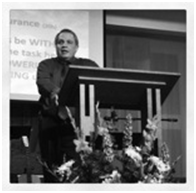 Don’s Upcoming Ministries
Don’s Upcoming Ministries
April 14, 2019 – Speak in morning worship services at Grace Community Church of Seal Beach.
Message: “The Triumphs and Failures of Israel’s Greatest King” (1 Kings 1-11)
My Website: www.donaldshoemakerministries.com
Temporary contact: shoemaker@gracesealbeach.org[/vc_column_text][/vc_column][/vc_row][vc_row][vc_column][vc_column_text]Appendix—Evangelical Creeds
The Nicene Creed (A.D. 325; Revised A.D. 381)
We believe in one God, the Father, the Almighty, maker of heaven and earth, of all that is, seen and unseen.
We believe in one Lord, Jesus Christ,
the only Son of God,
eternally begotten of the Father,
God from God, Light from Light,
true God from true God,
begotten, not made,
of one Being with the Father.
Through him all things were made.
For us and for our salvation
he came down from heaven:
by the power of the Holy Spirit
he became incarnate from the Virgin Mary,
and was made man.
For our sake he was crucified under Pontius Pilate;
he suffered death and was buried.
On the third day he rose again
in accordance with the Scriptures;
he ascended into heaven
and is seated at the right hand of the Father.
He will come again in glory to judge the living and the dead,
and his kingdom will have no end.
We believe in the Holy Spirit, the Lord, the giver of life,
who proceeds from the Father and the Son.
With the Father and the Son he is worshiped and glorified.
He has spoken through the Prophets.
We believe in one holy catholic and apostolic Church.
We acknowledge one baptism for the forgiveness of sins.
We look for the resurrection of the dead,
and the life of the world to come. Amen.
Statement of Faith of the
National Association of Evangelicals
• We believe the Bible to be the inspired, the only infallible, authoritative Word of God.
• We believe that there is one God, eternally existent in three persons: Father, Son and Holy Spirit.
• We believe in the deity of our Lord Jesus Christ, in His virgin birth, in His sinless life, in His miracles, in His vicarious and atoning death through His shed blood, in His bodily resurrection, in His ascension to the right hand of the Father, and in His personal return in power and glory.
• We believe that for the salvation of lost and sinful people, regeneration by the Holy Spirit is absolutely essential.
• We believe in the present ministry of the Holy Spirit by whose indwelling the Christian is enabled to live a godly life.
• We believe in the resurrection of both the saved and the lost; they that are saved unto the resurrection of life and they that are lost unto the resurrection of damnation.
• We believe in the spiritual unity of believers in our Lord Jesus Christ.
(The NAE was founded in 1942. It represents over 45,000 churches and ministries)[/vc_column_text][/vc_column][/vc_row]

